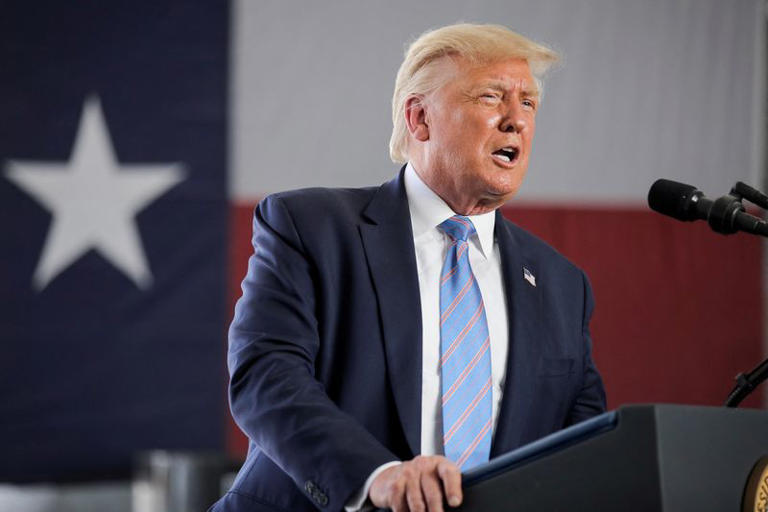Trump quid pro quo, Senate investigation, Trump campaign contributions, environmental regulations, oil industry influence, Trump fundraising event, U.S. environmental policy, Trump energy promises, Senate Finance Committee, Trump LNG exports
The U.S. Senate Finance and Budget Committees have launched an investigation into allegations that Donald Trump offered to roll back environmental regulations in exchange for $1 billion in campaign contributions from oil executives. Explore the implications of this potential quid pro quo on U.S. politics and environmental policy.

In a significant move, the U.S. Senate Finance and Budget Committees have initiated an investigation into allegations that presidential candidate Donald Trump offered to relax numerous environmental regulations in exchange for $1 billion in campaign contributions. This development has sent ripples through the political landscape, highlighting the complex interplay between political fundraising and environmental policy.
The Allegations
The investigation was launched following reports that Trump, during a campaign event at his Mar-a-Lago resort in Florida, proposed a “quid pro quo” to top executives from the oil industry. The proposal reportedly involved rolling back environmental regulations implemented during the Biden administration in return for substantial financial support for his campaign. The allegations were first brought to light by a top Democratic lawmaker on a U.S. House oversight panel, who sought information from nine oil companies regarding these reports.
Senate Response
Senate Finance Committee Chair Ron Wyden of Oregon and Senate Budget Committee Chairman Sheldon Whitehouse of Rhode Island are spearheading the investigation. In their announcement, they highlighted the potential misuse of campaign funds and the influence of big oil companies on political processes. Wyden and Whitehouse emphasized the urgency of examining how campaign money might be funneled into businesses and used to cover legal fees while benefiting from policies favoring corporate profits over public interest.
The Letters
The committee chairs have sent letters to several energy company CEOs and an industry trade group, requesting a range of materials. These include documents distributed at the fundraising event, descriptions of policy proposals discussed, drafts of any executive orders or policy proposals, and details of donations made to the Trump campaign. This extensive document request aims to uncover the extent of the alleged quid pro quo arrangement and its implications for U.S. environmental policy.
Trump’s Promises to the Oil Industry
At the heart of the investigation are the specific promises Trump reportedly made to the oil executives. According to media reports, Trump vowed to reverse numerous environmental rules and policies put in place by the Biden administration. These included plans to auction off more leases for oil drilling in the Gulf of Mexico, lift restrictions on drilling in the Alaskan Arctic, end the pause on liquefied natural gas (LNG) exports, and express his opposition to wind energy.
Gulf of Mexico and Alaskan Arctic Drilling
One of Trump’s key promises was to auction more oil drilling leases in the Gulf of Mexico and reverse the restrictions on drilling in the Alaskan Arctic. These regions are significant for their potential oil reserves, but they are also environmentally sensitive areas. Drilling in these locations has long been a contentious issue, with environmentalists warning about the risks to ecosystems and the climate.
LNG Exports
Trump also promised to lift the pause on LNG exports, a move that would benefit the natural gas industry. LNG exports have been a topic of debate, with proponents arguing that they boost the U.S. economy and energy independence, while opponents point to environmental concerns and the potential for increased greenhouse gas emissions.
Opposition to Wind Energy
Trump’s reported disdain for wind energy is another critical aspect of the investigation. Wind energy has been a cornerstone of the Biden administration’s efforts to transition to renewable energy and combat climate change. Trump’s opposition to this form of energy suggests a clear divergence from current federal policies and raises questions about the future of renewable energy initiatives under his potential presidency.
Political and Environmental Implications
The investigation by the Senate Finance and Budget Committees has significant political and environmental implications. Politically, it underscores the influence of corporate money in campaign financing and the potential for conflicts of interest when regulatory policies are influenced by financial contributions. Environmentally, the rollback of Biden-era regulations could have profound effects on the U.S.’s efforts to address climate change and protect natural resources.
Corporate Influence
The allegations against Trump highlight the ongoing issue of corporate influence in politics. If proven true, the quid pro quo arrangement could serve as a stark example of how financial contributions can sway policy decisions. This raises concerns about the integrity of democratic processes and the potential for policies that favor corporate interests over public welfare.
Environmental Policy
The potential reversal of Biden’s environmental regulations represents a significant shift in U.S. environmental policy. Biden’s administration has focused on reducing carbon emissions, protecting natural habitats, and promoting renewable energy. A rollback of these policies could hinder progress on climate change mitigation and environmental protection, affecting both national and global efforts to address environmental challenges.
Conclusion
The investigation into Trump’s alleged quid pro quo with energy executives marks a crucial moment in U.S. politics. As the Senate Finance and Budget Committees delve deeper into the allegations, the findings could have far-reaching consequences for campaign finance practices, corporate influence in politics, and the future of U.S. environmental policy. The outcome of this probe will be closely watched, not only for its political ramifications but also for its impact on the ongoing battle between economic interests and environmental stewardship.
Read More-